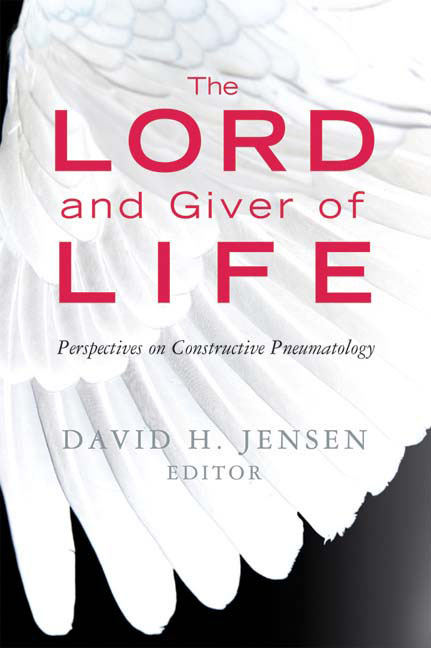David Jensen: The Lord and Giver of Life
 David H. Jensen, ed., The Lord and Giver of Life: Perspectives on Constructive Pneumatology (Louisville: Westminster/John Knox Press, 2008), xvii + 189 pages, ISBN 9780664231675.
David H. Jensen, ed., The Lord and Giver of Life: Perspectives on Constructive Pneumatology (Louisville: Westminster/John Knox Press, 2008), xvii + 189 pages, ISBN 9780664231675.
In the published world of often confusing or even misleading titles and subtitles, this collection offers clearly what its title promises: perspectives on constructive pneumatology. The authors of the ten chapters are well-known theologians from a variety of Christian perspectives and speak from these traditions to a common concern for a more complete understanding of the Holy Spirit. The editor provides both a general introduction to the book and a historical introduction to the range of existing theologies of the Holy Spirit that opens up the space for various themes of constructive pneumatology, touching on the relationship between Spirit and Scripture, the Spirit and world religions, and the Spirit’s presence in the world.
Essays by Amy Plantiga Pauw and Moly T. Marshall address the relationship of the Spirit and the biblical texts. Pauw connects with the editor’s theme of discernment and shows that a reading of Scripture without the Spirit can lead to a manipulation of the Word, and she suggests that Scripture itself needs to be exorcised from any false spirits. Marshall focuses on how the reading of Scripture can be understood as the Spirit’s activity that makes possible understanding and consensus, not only in our use of the Bible but also in our relationship with one another.
Essays by Roger Haight and Amos Yong speak to the question of the Spirit’s relationship to other religions and faith traditions. Haight explores how the “symbol of the Spirit of God” extends the important relationship between Christ and other religions and proposes that Christians must conclude that the Spirit is operative in other religions. His essay examines different strategies for using traditional theological language and shows how understanding the Spirit as symbol can inform a (cosmic) Christian understanding of God at work in the world. Yong’s essay investigates a pneumatological understanding of hospitality as a root metaphor for the Christian engagement of other religions. Engaging in dialogue the basic Christian attitudes of exclusivism, inclusivism, and pluralism, Yong proposes that a hermeneutic of hospitality – from a pneumatological perspective – can offer clarity and invigorate Christian relations with the worlds of other faiths.
This collection offers clearly what its title promises: perspectives on constructive pneumatology.
The concluding essays by Rieger and Cobb venture more closely into the world of political theology. Rieger analyzes the relationship of Spirit and empire and the possibility of resistance. The embodied Spirit, Rieger argues, overcomes the fragmentation of the postcolonial empire and bring a new sense of personhood and relationship. Cobb concludes the collection with a sweeping investigation of the Holy Spirit and the present age. Engaging economic and political tensions in today’s world, Cobb sees the Spirit as the power of balance, resistance, and transformation.
Category: In Depth, Winter 2011


